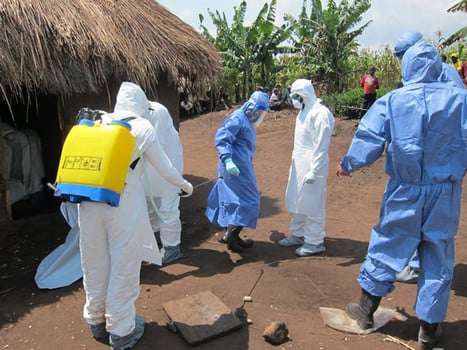I’ve avoided this blog subject like the plague. While the Ebola Virus has similar symptoms to the plague, I’ve been remiss in ignoring the Ebola epidemic in this blog for at least three reasons.
- The current Ebola outbreak is affecting international shipping.
- The Ebola epidemic is a “global threat”.
- Ebola is infecting and killing thousands of people.
 The first of the above three reasons directly ties Ebola to the overall subject of this blog; however, the second and third are more compelling reasons I should not have been avoiding the subject.
The first of the above three reasons directly ties Ebola to the overall subject of this blog; however, the second and third are more compelling reasons I should not have been avoiding the subject.
Thankfully, the world is not ignoring this epidemic and health care professionals are willing to put their lives on the line to treat the suffering and try to prevent the further outbreak of the Ebola Virus.
International shipping presents a risk of furthering the Ebola outbreak. Because of that scary reality, no international shipping blog or information outlet should ignore what’s happening right now with the Ebola Virus.
However, while the fear of international shipping spreading the Ebola Virus around the world may be high, the odds of that actually happening are low.
International shipping blogs or information outlets would be wise in attempting to do two things:
- To alleviate public fear of global Ebola spread through international shipping.
- To inform members of the international shipping industry on best practices to protect against Ebola infection and spread.
I do not mean to make it sound as though the Ebola epidemic happening right now should be taken lightly. Just the opposite.
The Hill reported that the head of the World Health Organization (WHO) called Ebola a “global threat” with the warning that only a significant international response could stop this global Ebola threat.
The article went on to quote the WHO Director General Margaret Chan:
“This Ebola epidemic is the largest, most severe, and most complex that we have ever seen,” Chan said.
“It has become a global threat that requires urgent action…. This is an international issue, a global threat, and it requires a coordinated effort.”
A recent Journal of Commerce (JOC) article notes how shipping is continuing between Ebola-stricken countries–Liberia, Nigeria, Sierra Leone, and Guinea–and the rest of the world (including shipments from these countries to the United States). But it also, very importantly, highlights how Maersk shared that no record of the Ebola virus being transmitted via international shipping exists.
Still, the international shipping industry is taking precautions to guard against Ebola spreading through crews shipping cargo on ships.
Here’s how the shipping companies ICS, IMEC, and ITF in a joint press release advised their members concerning risks calling in countries affected by the Ebola virus:
- The Master should ensure that the crew are aware of the risks, how the virus can be spread and how to reduce the risk.
- The ISPS requirements on ensuring that unauthorised personnel do not board the vessel should be strictly enforced throughout the duration of the vessel being in port.
- The Master should give careful consideration to granting any shore leave whilst in impacted ports.
- The shipowner/operator should avoid making crew changes in the ports of an affected country.
- After departure the crew should be aware of the symptoms and report any occurring symptoms immediately to the person in charge of medical care.
It’s not a bad idea for everyone to be informed about the Ebola Virus, including how it is transmitted and the symptoms of the disease.
Here’s information on the Ebola Virus from the WHO:
Transmission
Ebola is introduced into the human population through close contact with the blood, secretions, organs or other bodily fluids of infected animals….
Ebola then spreads in the community through human-to-human transmission, with infection resulting from direct contact (through broken skin or mucous membranes) with the blood, secretions, organs or other bodily fluids of infected people, and indirect contact with environments contaminated with such fluids. Burial ceremonies in which mourners have direct contact with the body of the deceased person can also play a role in the transmission of Ebola. Men who have recovered from the disease can still transmit the virus through their semen for up to 7 weeks after recovery from illness.
Signs and symptoms
EVD is a severe acute viral illness often characterized by the sudden onset of fever, intense weakness, muscle pain, headache and sore throat. This is followed by
vomiting, diarrhoea, rash, impaired kidney and liver function, and in some cases, both internal and external bleeding. Laboratory findings include low white blood cell and platelet counts and elevated liver enzymes.
The incubation period, that is, the time interval from infection with the virus to onset of symptoms, is 2 to 21 days.
Ebola Affecting International Shipping
In the meantime, shippers should be aware that the Ebola outbreak is affecting international shipping.
The Democratic Republic of Congo has been added to Liberia, Nigeria, Sierra Leone, and Guinea in the list of countries experiencing Ebola outbreak. While international shipping and trade continues with these countries, there have been ships turned away from ports, put into quarantine, and generally delayed because of communicable disease scare.
Cancellations and delays of shipments due to the Ebola outbreak are taking place. Still, most international commerce and shipping continues to take place with stricken countries.
